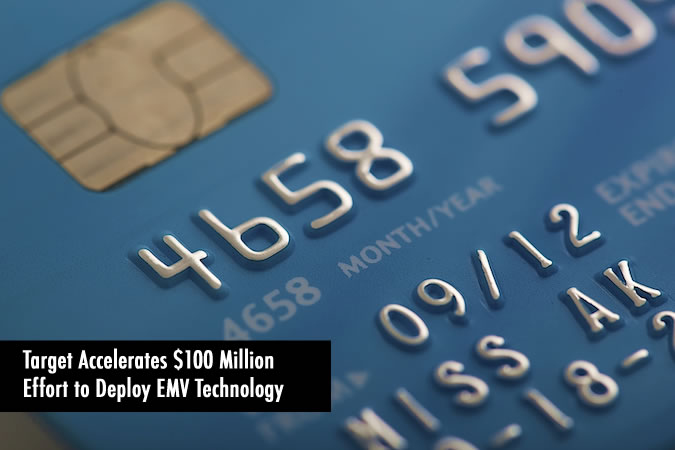
In his testimony before the Senate Committee on the Judiciary in Washington, D.C., Target Corp. Chief Financial Officer John Mulligan, said on Tuesday that the company would accelerate its implementation of smart card technology in an effort to reduce credit and debit card fraud stemming from customers shopping in its stores.
Mulligan discussed the company’s response to the recent massive data breach, and shared some of the efforts by the company to protect its customers and support industry initiatives to strengthen data security.
During his testimony, Mulligan said Target will equip its own “REDcards” and all of its store card readers in the U.S. with chip-enabled smart-card technology by the first quarter of 2015, more than six months ahead of previous plans. The accelerated timing is part of a $100 million effort to put in place chip-enabled technology in all of Target’s nearly 1,800 U.S. stores, the company said.
Following a proposal by MasterCard in May 2012 to form a cross-industry group to help drive the adoption of EMV technology in the United States, the Smart Card Alliance formed an independent, cross-industry organization in August 2012 called the EMV Migration Forum.
Target said that it became a founding and steering committee member of the EMV Migration Forum in 2012.
“EMV” technology—the name coming from its original creators Europay, MasterCard, and Visa—uses an embedded microchip and a personal identification number (PIN) to validate the card, its owner, and authorize payment transactions instead of a cardholder’s signature.
Popular in Europe, cards using EMV chip technology help reduce card fraud resulting from counterfeit, lost and stolen cards. Additionally, the technology can enable transactions across contactless, mobile, and remote payment channels. With EMV technology equipped payment cards, even if a card number is stolen in a data breach, cybercriminals cannot counterfeit the card.
Migration to EMV Inevitable But Expensive
Back in February 2011, former SecurityWeek columnist Christopher Justice commented on how 50-year-old plus magnetic stripe technology enables criminals to skim information directly from the cards with simple card reading devices or recreate payment cards using stolen payment card data.
“The migration will be neither fast nor inexpensive, requiring a hefty investment in new technology and new processes,” Justice wrote in a SecurityWeek column at the time. “Both merchants and consumers will need to continue to build a compelling business case for migration to chip and PIN cards in order to convince issuers and acquirers to change the payment infrastructure that is currently in place.”
However, the migration to EMV in the U.S. is inevitable, Justice said. “We can anticipate that there will continue to be a strong push to migrate to a new chip and PIN payment architecture in the United States, fueled by multi-national merchants who have seen fraud/chargeback benefits from implementations in other parts of the world.”
The recent breaches at Target, Nieman Marcus, Michaels Stores and White Lodging have built an incredible case to fuel the adoption of EMV technology in the US.
“Updating payment card technology and strengthening protections for American consumers is a shared responsibility and requires a collective and coordinated response. On behalf of Target, I am committing that we will be an active part of that solution,” Mulligan said in his testimony.
Related Reading: Will the U.S. be Able to Fend Off the EMV Card Standard Invasion?
Related Reading: Bank of America Starts Rollout of Chip Credit Cards to Consumers
Related Reading: Bank of America to Offer EMV Technology to Corporate Customers












